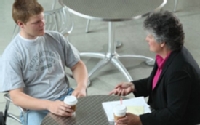BUSA 201: Value Creation in the Global Environment
Name: Steven Mattich
Hometown: Olympia, Wash.
Major: Undeclared, leaning Business or Economics
Professor: Carol Ptak, distinguished executive in residence

Steven’s advice to first-year students: “If you want to check out a class that you are thinking about taking in the next semester, I don’t think there’s a teacher at PLU who would mind if you sat in on their class for the day.”
When Steven Mattich heard about the exams he would later take in his Business 201 course, he liked what he heard.
“The professor doesn’t believe in multiple choice,” he said. “That would make you think there was only one correct answer.”
That didn’t mean the exams were easy. But it did speak to an idea that appeals to Mattich as a potential business or economics major: Being successful in business doesn’t mean a one-size-fits-all solution. It means comprehensively understanding an issue and applying that knowledge to specific situations.
Business 201, called “Value Creation in the Global Environment,” is designed to introduce students to the many aspects of business – from financial accounting and operations to marketing. By design, it covers a broad swathe. But that doesn’t mean students spend all their time with their nose in a book. Hardly.
“I thought the best way to conduct the class was to have the students apply what they are reading to a real idea for a business,” said Carol Ptak, distinguished executive in residence. “I have been very impressed with the quality of the ideas that the students develop and how realistic their business plans are.”
According to Jim Brock, dean of the School of Business, it is the way all the faculty members conduct their classes. Professors focus on making sure students have every opportunity to get important hands-on experience.
“We encourage students to be active learners, taking advantage of the opportunities we work to put before them, including participating in our mentor program and student clubs, and doing internships,” Brock said. “And we encourage students to get to know the faculty personally, so they can serve as guides, mentors and coaches.”
In the case of Mattich, that meant being treated almost as though he was a colleague of professor Ptak – not just a first-year student.
“What I like about this class is that the expectations were made very clear,” said Mattich. “Professor Ptak considered the course syllabus a contract with us. If she wanted to change anything, or we wanted to, then we all had to agree to it.”
Mattich paused for a moment. “Just like it is in business.”
To read about BIOL 125, click here.


